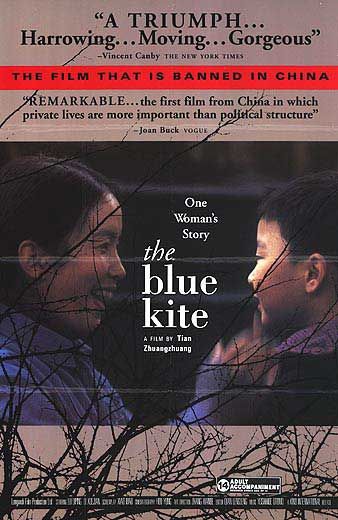- The Blue Kite
Infobox Chinese Film
name = The Blue Kite

caption = Movie Poster for The Blue Kite
director =Tian Zhuangzhuang
producer =Beijing Film Studio
writer =Mao Xiao
starring =Lu Liping Pu Quanxin Chen Xiaoman Li Xuejian Guo Baochang
music =Yoshihide Otomo
cinematography =Hou Yong
editing =Qian Lengleng
distributor =Kino International
released =September 12 ,1993
(Toronto Film Festival )October 2 ,1993
(New York Film Festival )
runtime = 140 minutes
language = Mandarin
budget =
preceded_by =
followed_by =
amg_id = 1:131147
imdb_id = 0107358
jianti = 蓝风筝
fanti = 藍風箏
pinyin = Lán fēngzheng"The Blue Kite" is a film directed by
Tian Zhuangzhuang in 1993. Though banned by the Chinese government upon its completion (along with a ten year ban on filmmaking imposed on Tian) [cite web|url=http://www.yesasia.com/us/yumcha/banned-in-china/0-0-0-arid.215-en/featured-article.html|author=James Mudge|title=Banned in China|accessdate=2008-10-10 (English)] , the film soon found a receptive international audience. Along with Chen Kaige's "Farewell My Concubine", "The Blue Kite" serves as one of the quintessential examples of China's Fifth Generation filmmaking, and in particular reveals the impact theCultural Revolution had upon directors who grew up in the 1950s and 1960s.The film won the Grand Prix at the
Tokyo International Film Festival , and Best Film at theHawaii International Film Festival , both in 1993.ynopsis
The story is told from the perspective of a young boy (Tietou) growing up in the 1950s and 1960s in
Beijing . Three episodes - Rectification Movement, theGreat Leap Forward and theCultural Revolution - show the family members evolving, e.g. from the real father, the "loving patriarch," to the protective but unemotional stepfather.Father
The first episode, entitled "Father," begins with a
wedding between the Lin Shaolong and Chen Shujuan in the early 1950s, shortly after the Communist victory. The wedding draws the whole neighborhood, a happy moment that will soon serve as a stark contrast with the years to come. The house andcourtyard are shown in a warm bright light as children play happily together.The couple soon give birth to a son, Tietou, meaning "iron head." In these early years Tietou's father creates for him a blue kite, a symbol that will remain throughout the film as a sign of better days. The father meanwhile, who works in a library has joined some of his friends in submitting "advice" to the Party as per the
Hundred Flowers Campaign . This soon returns to haunt him as the Hundred Flowers movement is followed by theAnti-Rightist Movement . In one of the film's most chilling scenes, the father's workplace has convened a meeting on the issue of who they will have to report to the Communist Party as a "rightist" in order to meet Mao's quota. The father quickly leaves for the bathroom. When he returns, all eyes are on him, it is clear who his colleagues have selected. Realizing his terrible mistake of leaving, the father briefly mistreats his son. Tietou now a small boy, is still bitter when his father is sent to a work camp. The chapter ends when Tietou's mother receives a letter; his father has been killed by a falling tree.Uncle
The second episode of the film is entitled "uncle" and deals with Tietou's mother's remarriage to a family friend, "Uncle" Li. The episode begins with a group picture during a wedding, with the men wearing blue work uniforms. Much of the episode's pallet seems to follow this opening trope as both the courtyard and house are shown in a cold blue. Uncle Li cares for the boy's material needs and desires but it soon grows clear that his health is failing. Li wants to become a party member, and is working feverishly at his job. Soon, malnutrition during the Great Leap Forward takes its toll and Uncle Li dies due to his poor health.
tepfather
No wedding ceremony, no feelings shown at all. This marriage is just to save the mother and son from
poverty , and to give them protection. They move in with the stepfather (Lao Wu). The house is so big that everyone has his own room, no family life at all. However, the character, a prominent party member about to be disgraced, worries about saving his wife and stepson and does what he can to provide a safe life for them before it is too late. He is dragged away by Red Guards. At the end the boy is lying on the ground and looks up to see the broken kite hanging in the tree.Themes
The film shows a series of patriarchal figures in Tietou's life. Each of the fathers is against the party, but each fails to provide a happy life for his family. Many symbols are used to show that the party is usurping the father, the mother and the family itself. The more the party takes control, the less emotions are shown and the more depressed the characters are.
Banned in mainland China
Because of its content, it was banned in
mainland China by the government.Awards
*
Hawaii International Film Festival , 1993
**Best Feature Film
*Tokyo International Film Festival , 1993
**Grand Prix
**Best Actress Award -Lu Liping
*Independent Spirit Awards , 1995
**Best Foreign FilmReferences
ee also
* "
Hibiscus Town " — anotherCultural Revolution drama, made several years prior to "The Blue Kite".External links
*imdb title|id=0107358|title=The Blue Kite
*amg title|id=1:131147|title=The Blue Kite
*rotten-tomatoes|id=blue_kite|title=The Blue Kite
Wikimedia Foundation. 2010.
